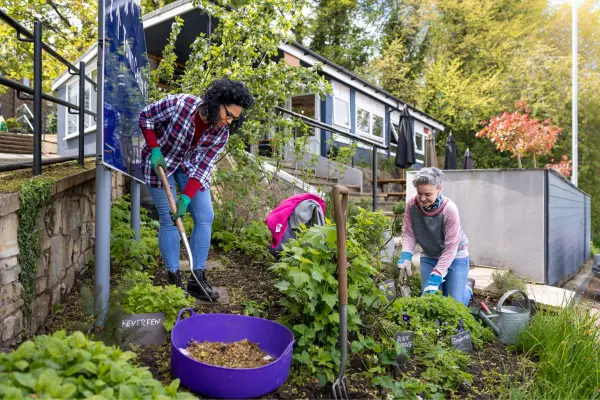Urban gardening has gained popularity in recent years as more people embrace the idea of growing their own food in urban settings.
Limited space and lack of access to traditional gardening areas are common challenges faced by urban dwellers. However, with the right knowledge and selection of suitable plants, it is possible to create a productive and enjoyable urban garden.
In this article, we will explore a variety of edible plants that are well-suited for urban gardening enthusiasts. Whether you have a small balcony, rooftop, or even just a sunny windowsill, there are edible plants that can thrive in urban environments.
Benefits of Urban Gardening
Urban gardening offers numerous benefits to individuals, communities, and the environment. Here are some of the key advantages:
- Access to Fresh and Nutritious Food: By growing your own edible plants, you have direct access to fresh and nutritious food. This allows you to incorporate a variety of vegetables, herbs, and fruits into your diet, providing you with essential vitamins, minerals, and antioxidants.
- Sustainable Food Production: Urban gardening promotes sustainability by reducing the carbon footprint associated with conventional food production and transportation. Growing your own food reduces reliance on industrial agriculture and supports local food systems.
- Enhanced Mental and Physical Well-being: Gardening has been shown to have numerous mental and physical health benefits. It can reduce stress, improve mood, increase physical activity, and enhance overall well-being. Urban gardening provides a space for relaxation, creativity, and connection with nature.
- Community Building: Urban gardens can bring communities together, fostering social connections and a sense of belonging. Shared gardens, community plots, and neighborhood gardening projects encourage collaboration, knowledge-sharing, and a stronger sense of community.
Edible Plants for Urban Gardens

When selecting edible plants for urban gardens, it is important to consider their adaptability to limited space, sunlight requirements, and maintenance needs. Here are some edible plants that are well-suited for urban gardening:
Salad Greens
Salad greens are excellent choices for urban gardens due to their compact size and quick growth. They can be grown in containers, vertical gardens, or small raised beds.
Varieties such as lettuce, arugula, spinach, and microgreens are perfect for continuous harvesting and provide a fresh supply of nutritious greens.
Herbs
Herbs are versatile and can be grown in small spaces such as windowsills or hanging baskets. They add flavor and aroma to dishes and are an essential part of any urban garden.
Some popular herbs suitable for urban gardening include basil, parsley, mint, rosemary, and chives. They can be used fresh or dried for culinary purposes.
Tomatoes
Tomatoes are well-loved by many gardeners and can be successfully grown in urban environments. Compact or determinate varieties are particularly suitable for containers and small spaces.
Cherry tomatoes, patio tomatoes, and dwarf varieties offer abundant harvests even in limited areas with ample sunlight.
Peppers
Peppers are another great choice for urban gardening. Compact varieties such as bell peppers and chili peppers can be grown in containers or hanging baskets.
They require a sunny location and regular watering. Peppers add spice and color to dishes and can be harvested throughout the growing season.
Strawberries
Strawberries are ideal for urban gardens due to their small, compact plants and delicious fruits. They can be grown in containers, hanging baskets, or vertical gardens.
Strawberries require well-drained soil, regular watering, and plenty of sunlight. The reward is a sweet harvest of juicy berries.
Table: Edible Plants for Urban Gardens
| Plant | Space Requirements | Sunlight Requirements |
|---|---|---|
| Lettuce | Compact | Partial shade to full sun |
| Basil | Compact | Full sun |
| Cherry Tomatoes | Compact | Full sun |
| Peppers | Compact | Full sun |
| Strawberries | Compact | Full sun |
Tips for Successful Urban Gardening
Choose the Right Containers
When space is limited, choosing the right containers is crucial. Opt for containers that are suitable for the size of the plant and have adequate drainage. Consider using vertical gardening techniques or hanging baskets to maximize space.
Provide Ample Sunlight
Most edible plants require a good amount of sunlight to thrive. Place your containers in areas that receive at least 6-8 hours of direct sunlight per day. If you have limited access to sunlight, consider using grow lights or selecting shade-tolerant plants.
Water and Fertilize Regularly
Urban environments can be challenging for plants due to limited soil and water resources. Ensure your plants receive regular watering, especially during hot and dry periods. Use organic fertilizers or compost to provide essential nutrients for healthy growth.
Practice Succession Planting
To maximize your harvest, practice succession planting. This involves sowing seeds or transplanting seedlings at regular intervals, ensuring a continuous supply of fresh produce throughout the growing season.
Control Pests and Diseases
Urban gardens are not immune to pests and diseases. Monitor your plants regularly for signs of pests or diseases and take appropriate action. Consider using organic pest control methods to minimize the use of chemicals.
Conclusion
Urban gardening provides a rewarding opportunity to grow your own food, even in limited spaces.
By selecting suitable edible plants, providing adequate care, and maximizing available resources, urban gardening enthusiasts can enjoy a bountiful harvest of fresh and nutritious produce.
Whether you have a small balcony or a rooftop, start your urban gardening journey and experience the joy and satisfaction of cultivating your own edible plants.
References
- Dunnett, N., & Kingsbury, N. (2011). Planting Green Roofs and Living Walls. Timber Press.
- Mars, R. (2010). The Edible Balcony: Growing Fresh Produce in Small Spaces. Mitchell Beazley.
- Reynolds, P. (2008). The Edible City: Growing and Cooking Fresh Food in Urban Spaces. New Society Publishers.
Additional Resources
- The Urban Farmer. (n.d.). Retrieved from www.theurbanfarmer.co
- Urban Gardens. (n.d.). Retrieved from www.urbangardensweb.com